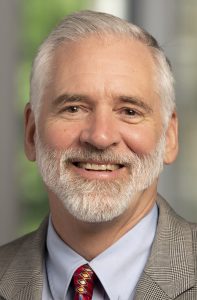Long ago, Carlyle Marney, an irascible Baptist preacher of blessed memory, praised Ralph Waldo Emerson for leaving the ministry because his conscience prevented him from serving the Lord’s Supper. Marney noted if he ever left the ministry, it would be because his conscience eventually forbade him from taking an offering. “You can’t stay in the ministry if you don’t take up a collection,” he reasoned.
Just last week, we found ourselves commending David Ramsey’s integrity for leaving the ministry because he no longer believes in God. We agreed it’s hard to stay in the ministry if you don’t believe what you’re preaching or don’t think God is present to comfort grieving people.
However, that honorable path made us think of others — horrifically, their number is legion — who departed the ministry not of their choosing, but because congregants deemed their sexual predation unacceptable for church employment.

Marv Knox

Curtis Freeman
In sadness, we considered the fates of Baptist clergy across the theological-political spectrum who have left the ministry due to moral transgressions and whose ranks are too numerous to count. We racked our brains trying to remember an occasion when a Baptist church or association that previously ordained a minister later rescinded that ordination due to apostasy or immorality.
While numerous faith traditions and even some Baptists feel responsible to revoke ordination when warranted, examples of defrocked Baptists are hard to come by.
This left us to ask if most Baptists ultimately consider ordination a matter of individual conscience — or preference, or convenience — rather than an issue of corporate discernment and responsibility.
Take the example of Johnny Hunt. Last week, we learned a self-appointed panel of four pastors had pronounced Hunt, a former Southern Baptist Convention president, restored to active ministry less than six months after he stepped down when allegations of sexual assault became public. Current SBC President Bart Barber expressed understandable outrage at their ploy, exclaiming, “I would permanently defrock Johnny Hunt if I had the authority to do so.”
“Neither Barber nor the denomination possess the authority to unfrock Hunt or any other pastor.”
Yet neither Barber nor the denomination possess the authority to unfrock Hunt or any other pastor. In Baptist polity, no outside body, no matter how large or influential, can force a congregation to accept a decision it does not choose.
Still, we question the ministerial reinstatement of such a serious offender by an independent and unelected presbytery in such a short time without wider ecclesial oversight or process. We think the revocation of ordination by the church that ordained a now-unfit minister might provide recourse to such a travesty.
But as we considered Hunt’s “restoration” to ministry, we lamented the many times ordaining congregations looked the other way when ministers upon whom they had laid hands of righteous commitment turned from fidelity to lechery, using the pastorate as a platform to prey on congregants.
We do not think we are alone in asking: If atheism and sexual abuse are not sufficient cause for revoking an ordination in Baptist polity, what, if anything, might be sufficient? (This is not to equate atheism with sexual misconduct.)
Yet this raises even bigger questions. What does ordination mean for Baptists? And who has the authority to ordain — and to un-ordain — a Baptist minister?
“Who has the authority to ordain — and to un-ordain — a Baptist minister?”
Much is unclear about ordination among Baptists, but one thing is crystal clear. Ordination is a communal process, not a private matter. It involves a candidate discerning whether God is calling her or him to ministry, but it also entails confirmation of a candidate’s fitness for ministry by a local congregation.
When both discernment and confirmation are satisfied, candidates stand for examination about calling, character and confession by an ordination council. Congregations typically initiate the ordination process, but because ordination commends ministers to the wider church, other ordained ministers in the congregation, association, fellowship or region often comprise the councils.
But what is the point of ordination? Many Christian traditions, including some Baptists, view ordination as transformational. According to this view, ordination indicates the one who is ordained has been changed. The one being ordained does not simply receive a gift but becomes a minister of the gospel. Ordained ministry is not something we do; it is something we are.
Most Baptists, however, probably see ordination as a symbol — confirmation of a minister’s calling. They contend the laying on of hands does not confer any ministerial gift, but does confirm the gift of God. Nineteenth century Baptist icon Charles H. Spurgeon insisted “there is no special gift to bestow” in ordination, asking: “Is not the divine call the real ordination to preach, and the call of the church the only ordination to the pastorate?”
The tendency to look upon sacred rituals as symbolic rather than sacramental — in addition to ordination, consider the interpretations of baptism and the Lord’s Supper as mere symbols— can be seen to diminish their importance.
“The church has done its duty, and now the minister becomes a religious free agent.”
For example, most Baptists don’t think baptism saves a soul or that in the Lord’s Supper the elements become the body and blood of Christ. So, we should not be surprised if churches similarly hold a diminished view of ordination as a one-and-done event. Beloved church members lay hands on a new minister, pray for God’s blessing, and then send her or him on their way. The church has done its duty, and now the minister becomes a religious free agent, disconnected from accountability to the community who did the initial discerning and confirming.
Such thinking ignores the interdependence between the congregation and the wider church. Baptists tend to think of interdependence as how we cooperate to conduct missions and all kinds of ministry. However, few — if any — congregational actions impact other churches more than the ordination of ministers. The implications of the one-time act of ordination multiply geometrically as that ordained minister goes forth to serve other churches, which look to ordination as validation of calling and fitness.
Both of us reflect that principle. Congregations we love ordained each of us as ministers, and churches, schools and other groups have recognized our ordination, offering us opportunities to exercise our gifts in ministry.
We lament the numerous examples of clergy who leveraged their ordinations into trust that enabled them to prey upon unsuspecting congregants. We also acknowledge the shock and sadness we feel when we realize most, if not all, congregations that ordained abusive ministers will not revoke those ordinations, nor will unfit ministers surrender their credentials to the congregation that ordained them.
Yes, those congregations and ministers revel in freedom — soul liberty and church autonomy — as Baptist principles. But they likewise should embrace the responsibility of discipleship. A church that ordains should think of ordination as a lifelong covenant with that minister. On most occasions, this will ensure a lifetime of mutual blessing, for ministers can make proud the congregations that affirmed and sent them, and those congregations’ love and prayers can strengthen ministers through decades of service.
“Difficulty should not block responsibility.”
We’re not naïve. We know this is not easy. But difficulty should not block responsibility. Ministers who stop believing or betray the trust placed in them at ordination should voluntarily surrender their ordination certificates. Likewise, in keeping up with those they ordained, churches that learn about apostasy or immorality should revoke ordination. And as the Southern Baptist crisis has demonstrated, denominational bodies should help churches keep up with their ordained clergy.
Baptists commonly affirm their eternal destiny is secure. “Once saved; always saved,” they say. What this often means is, “If you get right with the Lord, you can live just like you want to the rest of the time.” We think that is a little too convenient for salvation or ordination. Indeed, we don’t believe this principle even applies to clergy. “Once ordained” does not have to mean “always ordained.”
Curtis W. Freeman is research professor of theology and Baptist studies and director of the Baptist House of Studies at Duke Divinity School. His research and teaching explore areas of Free Church theology. Marv Knox, now retired, founded Fellowship Southwest, a regional ecumenical network. Previously, he was a journalist for four decades, including almost 20 years as editor of the Baptist Standard in Texas.
Related articles:
What a Baptist learned from the Methodists at Duke Divinity School and why I left both denominations behind | Opinion by David Ramsey
SBC president blasts idea of Johnny Hunt’s ‘restoration’ to ministry
What have we learned about Matt Chandler’s sin and restoration? Not much | Analysis by Rick Pidcock


